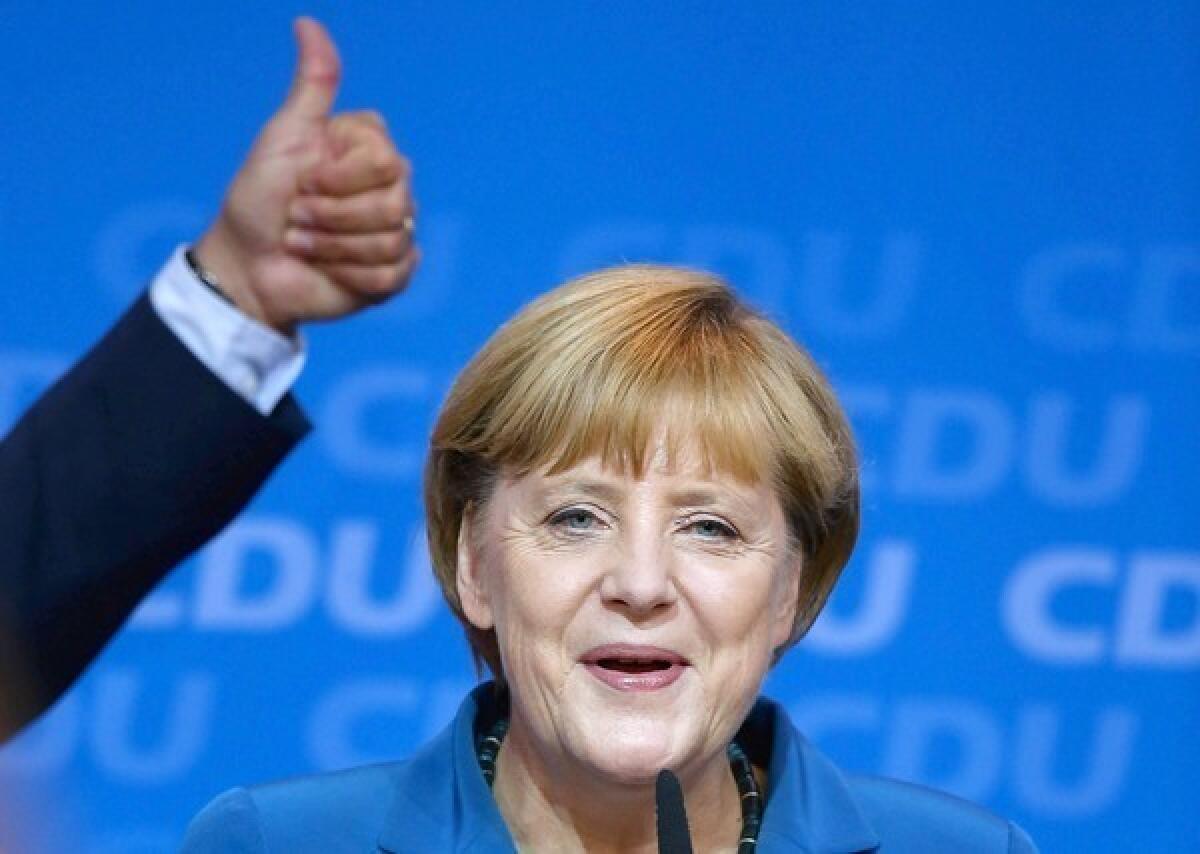Angela Merkel’s Christian Democrats win German elections

- Share via
BERLIN — Angela Merkel’s conservatives won a major victory in Sunday’s German elections, according to official results, putting her in position to serve a third term as chancellor after negotiations to form a coalition with the left-wing opposition.
The results showed Merkel’s Christian Democratic Union at 41.5%, leading the main opposition Social Democrats by 17 percentage points.
A new party founded in opposition to the euro, the Alternative for Germany, received 4.7% of the vote, below the 5% threshold needed to enter Parliament. Merkel’s current coalition partners, the Free Democrats, had 4.8% of the vote. It means that the liberal, pro-business party will drop out of the Bundestag, the lower house, for the first time in its history.
The Christian Democrats will probably seek a “grand coalition” with the Social Democrats to form a stable government.
“This is a super result,” said Merkel, 59, when it became clear she is on target to serve another four-year term. “Together, we will do all we can to make the next four years successful ones for Germany.”
Projections based on early results showed the Christian Democrats winning 296 seats in the 598-seat Bundestag, four seats short of a majority. The Social Democrats would have 182 seats, and their allies, the Greens, 60. Die Linke, or the Left, a far-left party descended from East Germany’s Communists, would also have 60 seats.
The Free Democrats had been the kingmaker of German politics since the first postwar vote in 1949. But the party has struggled as Merkel’s junior coalition partner. While the chancellor has claimed credit for Germany’s economic success, little of the Free Democrats’ political program has been enacted.
Christian Lindner, a former general secretary of the party, told state broadcaster ARD that Sunday’s elections marked “the most bitter hour since 1949” for his party.
The Christian Democrats’ share of the vote was up 8 percentage points from the 2009 elections, but the Free Democrats’ plummeted. Ursula von der Leyen, the Christian Democratic labor minister, told ARD that the outcome was “simply fantastic” for her party.
As its price for joining a coalition, the Social Democrats would be expected to demand the introduction of a national minimum wage and an increase in the top rate of taxation. Both policies are opposed by the Christian Democrats as harmful for job creation.
The Social Democrats may also push for a softer line on the Eurozone crisis, including some means of jointly guaranteeing state debts across the single currency zone.
Surveys show that Merkel’s cautious handling of the Eurozone crisis is strongly endorsed by the public. After eight years in power, her approval ratings still regularly top 60%.
The chancellor has presided over a strong economy with low unemployment. She boasts of keeping Germany stable despite turmoil across the continent.
Her Social Democratic challenger, Peer Steinbrueck, has accused her of prescribing a “deadly dose” of austerity for the Eurozone, saying the government’s crisis strategy lacks a “growth impulse.”
Germany’s new government will have to steer the country through a dramatic shift to renewable energy and cope with the needs of an aging population.
Vasagar is a special correspondent.
More to Read
Sign up for Essential California
The most important California stories and recommendations in your inbox every morning.
You may occasionally receive promotional content from the Los Angeles Times.










